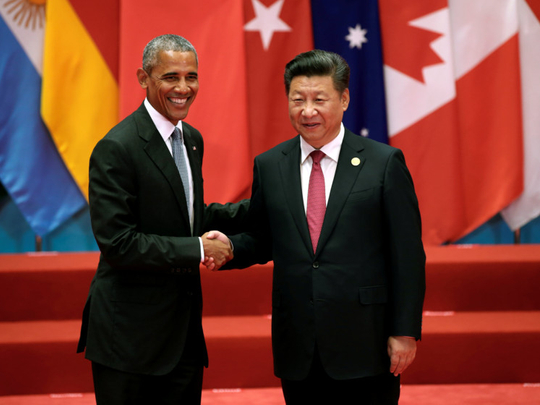
It is tragic and fitting that United States President Barack Obama’s latest failure to reach a ceasefire in Syria would take place at Hangzhou, China, on the sidelines of the G20 summit that ended last Monday.
It’s tragic because this latest diplomatic flop on Syria will mean the death toll in that civil war, already at a staggering 400,000, will grow. It’s fitting, though, because the rationale for Obama’s reluctance to intervene in Syria goes back to a first-term strategy to pivot diplomatic attention and military hardware away from wars in the Middle East to the Asia-Pacific region.
Susan Rice, Obama’s National Security Adviser, helpfully explained all this in a post at Medium over the weekend. She wrote that Obama understood the US needed to focus on the Asia-Pacific, even though the wars he was trying to end were half a world away. The “Rebalance to Asia”, as Rice is now calling it, was born. She writes: “In endeavouring to renew and strengthen US leadership in the 21st century, President Obama recognised that failing to reorient our foreign policy towards the region would not only be imprudent, it would also be potentially perilous.” (Positively!)
The rest of the post reads like an extended high five. There is an animation about the Trans-Pacific Partnership and a bunch of feel-good Obama quotes. Leaders have been engaged. Alliances have been strengthened.
To give Rice and Obama some credit, they are correct about the importance of the region. After the 9/11 terrorist attacks, much US attention was focused on the Muslim world and wars in Iraq and Afghanistan. China is a rising power and the US is well served by re-investing in its relationships with Japan, South Korea and the Philippines and forging new partnerships with Vietnam, India and Myanmar.
In this sense, the Asia pivot has produced some tangible results. Obama also got China to agree to begin cutting carbon emissions by 2030. In 2015, he ironed out a deal with China on cyberattacks to establish some rules of the road in this new field of great power competition.
But despite the rebalance/pivot, Obama has yet to do much about the elephant in the room — Beijing’s aggressive moves in the South China Sea to dredge up new islands and lay claim to the territorial waters of other US allies like the Philippines. Its neighbours fear that China is unilaterally staking claim to the waterways that are the economic lifeline of the region.
Obama’s administration has, week before last, encouraged the Philippines to work out the dispute over artificial islands with China on its own, despite the White House support for a ruling at The Hague in July against China’s claims to the waterways it had claimed. On this front, Obama’s new strategic focus is in trouble. While he raised the South China Sea in a one-on-one discussion with China’s President Xi Jinping, the issue was kept off the agenda of the G20 summit. And despite Obama’s private warnings, the Chinese government showed contempt for the US president: When Air Force One landed at Hangzhou, the Chinese did not extend red-carpeted stairs by which Obama could exit the plane.
All of this is to say that despite the patient work the Obama administration has done in building Asian alliances, it has yet to turn this diplomacy into a policy that actually deters China. This point was driven home during the G20 summit, when Chinese boats were spotted at Scarborough Shoal, another waterway claimed by the Philippines where the US has warned China not to stake out more artificial islands.
There are many reasons China has not been deterred, but one of them is likely that Xi took the measure of Obama when he shirked his own “red line” in Syria back in 2013 after evidence showed that the regime of Syrian President Bashar Al Assad had gassed its own people.
Earlier this year, Obama told the Atlantic’s Jeffrey Goldberg that he thought his decision not to enforce that “red line” was his proudest moment. It may also be the moment that China learned it could defy the US president and face no consequences. Put another way, Obama undermined his pivot to Asia by the way he began to leave the Middle East.
— Bloomberg
Eli Lake is a Bloomberg View columnist.












